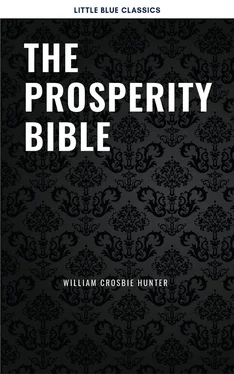QUESTIONS AND EXERCISES
1. ( a ) What elements of appeal do you find in the following? ( b ) Is it too florid? ( c ) Is this style equally powerful today? ( d ) Are the sentences too long and involved for clearness and force?
Oh, gentlemen, am I this day only the counsel of my client? No, no; I am the advocate of humanity—of yourselves—your homes—your wives—your families—your little children. I am glad that this case exhibits such atrocity; unmarked as it is by any mitigatory feature, it may stop the frightful advance of this calamity; it will be met now, and marked with vengeance. If it be not, farewell to the virtues of your country; farewell to all confidence between man and man; farewell to that unsuspicious and reciprocal tenderness, without which marriage is but a consecrated curse. If oaths are to be violated, laws disregarded, friendship betrayed, humanity trampled, national and individual honor stained, and if a jury of fathers and of husbands will give such miscreancy a passport to their homes, and wives, and daughters,—farewell to all that yet remains of Ireland! But I will not cast such a doubt upon the character of my country. Against the sneer of the foe, and the skepticism of the foreigner, I will still point to the domestic virtues, that no perfidy could barter, and no bribery can purchase, that with a Roman usage, at once embellish and consecrate households, giving to the society of the hearth all the purity of the altar; that lingering alike in the palace and the cottage, are still to be found scattered over this land—the relic of what she was—the source perhaps of what she may be—the lone, the stately, and magnificent memorials, that rearing their majesty amid surrounding ruins, serve at once as the landmarks of the departed glory, and the models by which the future may be erected.
Preserve those virtues with a vestal fidelity; mark this day, by your verdict, your horror of their profanation; and believe me, when the hand which records that verdict shall be dust, and the tongue that asks it, traceless in the grave, many a happy home will bless its consequences, and many a mother teach her little child to hate the impious treason of adultery.
–Charles Phillips.
2. Analyze and criticise the forms of appeal used in the selections from Hoar, Story, and Kipling.
3. What is the type of persuasion used by Senator Thurston (page 50)?
4. Cite two examples each, from selections in this volume, in which speakers sought to be persuasive by securing the hearers' ( a ) sympathy for themselves; ( b ) sympathy with their subjects; ( c ) self-pity.
5. Make a short address using persuasion.
6. What other methods of persuasion than those here mentioned can you name?
7. Is it easier to persuade men to change their course of conduct than to persuade them to continue in a given course? Give examples to support your belief.
8. In how far are we justified in making an appeal to self-interest in order to lead men to adopt a given course?
9. Does the merit of the course have any bearing on the merit of the methods used?
10. Illustrate an unworthy method of using persuasion.
11. Deliver a short speech on the value of skill in persuasion.
12. Does effective persuasion always produce conviction?
13. Does conviction always result in action?
14. Is it fair for counsel to appeal to the emotions of a jury in a murder trial?
15. Ought the judge use persuasion in making his charge?
16. Say how self-consciousness may hinder the power of persuasion in a speaker.
17. Is emotion without words ever persuasive? If so, illustrate.
18. Might gestures without words be persuasive? If so, illustrate.
19. Has posture in a speaker anything to do with persuasion? Discuss.
20. Has voice? Discuss.
21. Has manner? Discuss.
22. What effect does personal magnetism have in producing conviction?
23. Discuss the relation of persuasion to ( a ) description; ( b ) narration; ( c ) exposition; ( d ) pure reason.
24. What is the effect of over-persuasion?
25. Make a short speech on the effect of the constant use of persuasion on the sincerity of the speaker himself.
26. Show by example how a general statement is not as persuasive as a concrete example illustrating the point being discussed.
27. Show by example how brevity is of value in persuasion.
28. Discuss the importance of avoiding an antagonistic attitude in persuasion.
29. What is the most persuasive passage you have found in the selections of this volume. On what do you base your decision?
30. Cite a persuasive passage from some other source. Read or recite it aloud.
31. Make a list of the emotional bases of appeal, grading them from low to high, according to your estimate.
32. Would circumstances make any difference in such grading? If so, give examples.
33. Deliver a short, passionate appeal to a jury, pleading for justice to a poor widow.
34. Deliver a short appeal to men to give up some evil way.
35. Criticise the structure of the sentence beginning with the last line of page 296.
Success in business, in the last analysis, turns upon touching the imagination of crowds. The reason that preachers in this present generation are less successful in getting people to want goodness than business men are in getting them to want motorcars, hats, and pianolas, is that business men as a class are more close and desperate students of human nature, and have boned down harder to the art of touching the imaginations of the crowds.
—Gerald Stanley Lee,
Crowds .
In the early part of July, 1914, a collection of Frenchmen in Paris, or Germans in Berlin, was not a crowd in a psychological sense. Each individual had his own special interests and needs, and there was no powerful common idea to unify them. A group then represented only a collection of individuals. A month later, any collection of Frenchmen or Germans formed a crowd: Patriotism, hate, a common fear, a pervasive grief, had unified the individuals.
The psychology of the crowd is far different from the psychology of the personal members that compose it. The crowd is a distinct entity. Individuals restrain and subdue many of their impulses at the dictates of reason. The crowd never reasons. It only feels. As persons there is a sense of responsibility attached to our actions which checks many of our incitements, but the sense of responsibility is lost in the crowd because of its numbers. The crowd is exceedingly suggestible and will act upon the wildest and most extreme ideas. The crowd-mind is primitive and will cheer plans and perform actions which its members would utterly repudiate.
A mob is only a highly-wrought crowd. Ruskin's description is fitting: "You can talk a mob into anything; its feelings may be—usually are—on the whole, generous and right, but it has no foundation for them, no hold of them. You may tease or tickle it into anything at your pleasure. It thinks by infection, for the most part, catching an opinion like a cold, and there is nothing so little that it will not roar itself wild about, when the fit is on, nothing so great but it will forget in an hour when the fit is past."
History will show us how the crowd-mind works. The medieval mind was not given to reasoning; the medieval man attached great weight to the utterance of authority; his religion touched chiefly the emotions. These conditions provided a rich soil for the propagation of the crowd-mind when, in the eleventh century, flagellation, a voluntary self-scourging, was preached by the monks. Substituting flagellation for reciting penitential psalms was advocated by the reformers. A scale was drawn up, making one thousand strokes equivalent to ten psalms, or fifteen thousand to the entire psalter. This craze spread by leaps—and crowds. Flagellant fraternities sprang up. Priests carrying banners led through the streets great processions reciting prayers and whipping their bloody bodies with leathern thongs fitted with four iron points. Pope Clement denounced this practise and several of the leaders of these processions had to be burned at the stake before the frenzy could be uprooted.
Читать дальше












